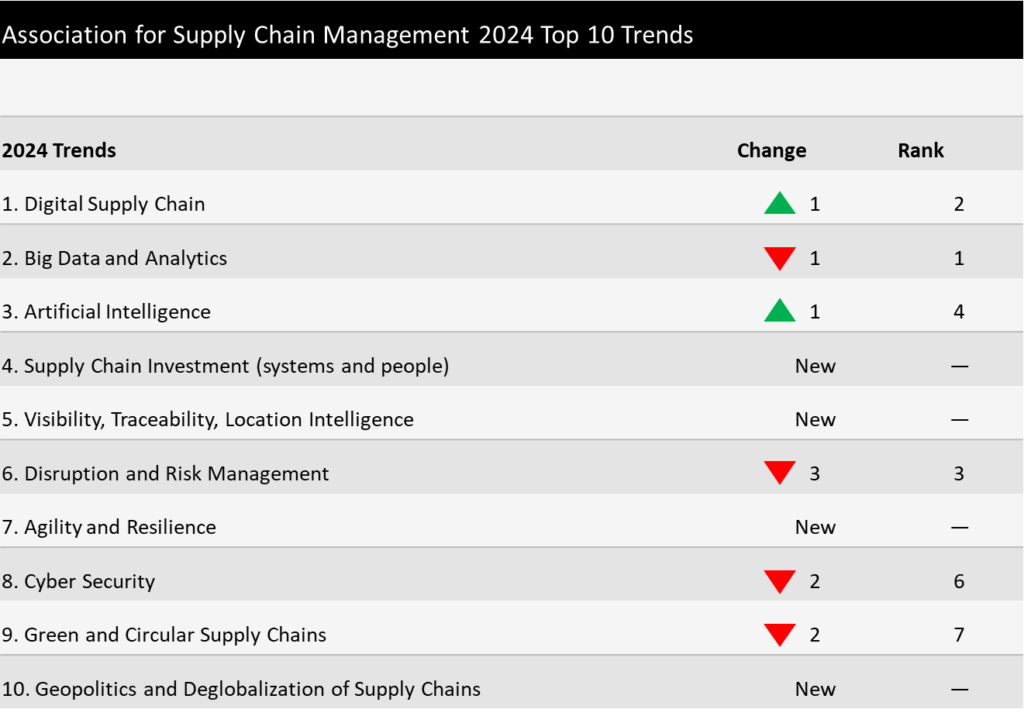Add Yes, AI is one of them!
In today’s rapidly evolving business landscape, it is crucial for supply chain professionals to keep their fingers on the pulse of industry trends. Recently, the Association for Supply Chain Management (ASCM) unveiled its Top 10 Supply Chain Trends for 2024 during the ASCM Connect conference, held in Louisville, Kentucky [^1^].

Let’s explore these trends and understand how they will shape the future of supply chain management:
- Digital Supply Chain: As the world becomes increasingly interconnected, businesses must transform their supply chain networks into connected, intelligent, scalable, and nimble digital ecosystems. Implementing digital technologies and automation will enhance efficiency, enable real-time insights, and optimize the flow of goods and information [^1^].
- Big Data and Analytics: The utilization and analysis of vast amounts of data will empower supply chains to identify inefficiencies, reduce costs, improve customer service, and strengthen resilience and agility. With the help of advanced analytics tools, organizations can make data-driven decisions that drive enhanced operational performance [^1^].
- Artificial Intelligence: Artificial intelligence (AI) is set to play an increasingly significant role in supply chain management. AI technologies, such as machine learning and predictive analytics, will facilitate demand forecasting, quality control, new product development, and more. Harnessing the power of AI will help organizations gain competitive advantages through intelligent decision-making [^1^].
- Supply Chain Investment (systems and people): To foster innovation and success, it is crucial to invest in both systems and people. Organizations need to create a culture of innovation that encourages employees to share ideas and adopt cutting-edge technologies. Moreover, investing in talent development and training will equip supply chain professionals with the skills necessary to tackle future challenges [^1^].
- Visibility, Traceability, Location Intelligence: Supply chain visibility and traceability will become even more critical in the coming years. With the increasing interconnectedness of supply chains, organizations need to track the movement of goods and materials across every tier of their networks. Location intelligence will provide them with essential context to optimize operations and respond swiftly to disruptions [^1^].
- Disruption and Risk Management: Supply chain disruptions have become the norm in recent times, necessitating effective risk management strategies. Companies must proactively identify and assess risks, communicate effectively with stakeholders, develop mitigation strategies, and regularly test and rehearse their plans. By embracing these practices, organizations can enhance their resilience and minimize the impact of disruptions [^1^].
- Agility and Resilience: The ability to adapt and respond swiftly to changing circumstances will be crucial for supply chain success. This requires not only the deployment of advanced technologies but also the cultivation of cross-functional teams that can collaborate and problem-solve effectively. Employing skilled employees to work alongside sophisticated technology will enable organizations to embrace agility and resilience [^1^].
- Cyber Security: As supply chains increasingly rely on digital technologies and interconnected systems, ensuring robust cybersecurity measures is paramount. Organizations must implement cybersecurity solutions, provide training and awareness programs, and undertake proactive measures to prevent data breaches and their associated consequences. Being vigilant in the face of evolving cyber threats is essential for maintaining the integrity and security of supply chains [^1^].
- Green and Circular Supply Chains: With growing environmental concerns, organizations are expected to prioritize sustainability in their supply chain practices. Collaboration with partners, educating employees, setting clear targets, measuring impact, and reporting progress will help drive the transition towards green and circular supply chains. By aligning their operations with sustainable practices, organizations can reduce their environmental footprint while remaining competitive [^1^].
- Geopolitics and Deglobalization of Supply Chains Change: Geopolitics and the deglobalization of supply chains will lead organizations to simplify their networks through nearshoring and friend-shoring. While this shift aims to improve security and resilience, it may also lead to higher prices, limited choice, and reduced innovation due to smaller market sizes. Organizations must navigate these changes strategically to bolster their supply chain operations [^1^].
Embracing these top supply chain trends will empower organizations to drive innovation, enhance customer service, and stay competitive in the dynamic business landscape of 2024. However, it is crucial to remember that these trends are interconnected and should not be adopted in isolation. By holistically integrating these trends, organizations can position themselves for success in the years to come.
Source: ASCM Connect Conference, ASCM Insights
Note: The information and trends mentioned in this article were released during the ASCM Connect conference held in Louisville, Kentucky.

One Response
This is my first time visit at here and i am truly pleassant to read all at one place.
Look into my web-site Twyla